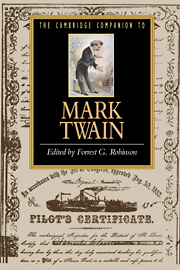Book contents
- Frontmatter
- 1 Mark Twain as an American Icon
- 2 The Innocent at Large
- 3 Mark Twain and Women
- 4 Mark Twain's Civil War
- 5 Banned in Concord
- 6 Black Critics and Mark Twain
- 7 Mr. Clemens and Jim Crow
- 8 Speech Acts and Social Action
- 9 How the Boss Played the Game
- 10 Mark Twain's Travels in the Racial Occult
- 11 Mark Twain's Theology
- Further Reading
- Index
- Continued Series List
3 - Mark Twain and Women
Published online by Cambridge University Press: 28 May 2006
- Frontmatter
- 1 Mark Twain as an American Icon
- 2 The Innocent at Large
- 3 Mark Twain and Women
- 4 Mark Twain's Civil War
- 5 Banned in Concord
- 6 Black Critics and Mark Twain
- 7 Mr. Clemens and Jim Crow
- 8 Speech Acts and Social Action
- 9 How the Boss Played the Game
- 10 Mark Twain's Travels in the Racial Occult
- 11 Mark Twain's Theology
- Further Reading
- Index
- Continued Series List
Summary
What roles did women play in Mark Twain's life, and what roles did Twain assign them in his work? Until recently, most critics who have addressed these questions at all have tended to fall into one of two camps: those who felt women were bad for Twain and those who felt Twain was bad for women. Both of these positions have their supporters, yet each is flawed.
The “women were bad for Twain” argument was first voiced by Van Wyck Brooks in his influential 1920 study, The Ordeal of Mark Twain, in which he charged women - and Twain's wife, Livy, in particular - with having censored, bowdlerized, and emasculated Twain's work. “From the moment of his marriage,” Twain's “artistic integrity,” Brooks wrote, was “virtually destroyed.” Justin Kaplan, in his 1966 Pulitzer Prize-winning biography, blamed Livy for having forced her bankrupt husband to embark on a grueling schedule of lecturing to pay back his creditors when easier (and, in Livy's view, less ethically spotless) routes had been available to him. Whether they were editing his prose or editing his person, whether they were running up household expenses that forced Twain to write too much or creating moral imperatives that allowed him to write too little, women were “bad for Twain.” So the argument went.
- Type
- Chapter
- Information
- The Cambridge Companion to Mark Twain , pp. 52 - 73Publisher: Cambridge University PressPrint publication year: 1995
- 2
- Cited by

